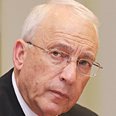

An American research foundation announced on Thursday that following the decision of the British University and College Union (UCU) to consider launching an academic boycott of Israel it has cancelled its plans to open a grant application process for UK researchers.
The $150 million Goldhirsh foundation supports scientists around the world in the quest for a cure for brain cancer funds research.
In a letter to British academic institutions, foundation leader Elizabeth Goldhirsh writes: " As a director of a $150 million foundation that supports scientists around the world in the quest for a cure for brain cancer, I am profoundly disappointed in your union's decision to boycott Israel today.
"This action represents a severe setback for academic freedom and open discourse. Moreover, the decision to single out and demonize Israel above and beyond all other countries - remaining silent over Russia's brutal occupation in Chechnya, for example, or China's ongoing oppression of Tibet - is, at best, troubling. At worst, it points to a far more sinister and tragic motivation.
"Equally disturbing is to do so at a time when Israel's civilians are facing near-daily missile attacks from Gaza and her partner for negotiations is an organization that dispatches suicide bombers and refuses to recognize the Jewish State's right to exist.
"Given this decision, I am deeply saddened to say that while my foundation had been considering opening up our scientific grant process to British researchers we will no longer be able to do so. I urge you to work against this boycott and restore learning's highest ideal of fairness free of prejudice to British academia."
'Freezing Jewish donations to UK institutions'
Meanwhile Immigrant Absorption Minister Ze'ev Boim has suggested that Jewish donors supporting academic institutions in the United Kingdom freeze their donations following the boycott proposal.
Boim, who is currently in London, said he plans to discuss the issue with leaders of the Jewish community in Britain and with Israeli representatives who have held talks on the issue with British higher education officials.
"The UCU's decision is extremely serious. It compels the Israeli government to reconsider its actions. Likewise world Jewry must also consider its steps against this futile boycott. I intend to propose a counter-boycott against British acadmic institutions during the cabinet meeting on Sunday," said Boim.
Bill Rammell, Britain's higher education minister, said he was disappointed the union had passed a motion ''which encourages its members to consider boycotting Israeli academics.''
''I profoundly believe this does nothing to promote the Middle East peace process,'' he said.
It was further reported on Thursday that UNISON, the biggest trade union in Britain, is considering renewing its economic boycott of Israel as an act of protest against last summer’s Second Lebanon War and the IDF strikes in Gaza.
In 2002 the organization, which represents some 1.6 million workers, prohibited the purchase of Israeli goods and investments in the Jewish state. The sanctions were lifted following Israel’s disengagement from the Gaza Strip in the summer of 2005.
Ronny Sofer, Tani Goldstein contributed to this report















